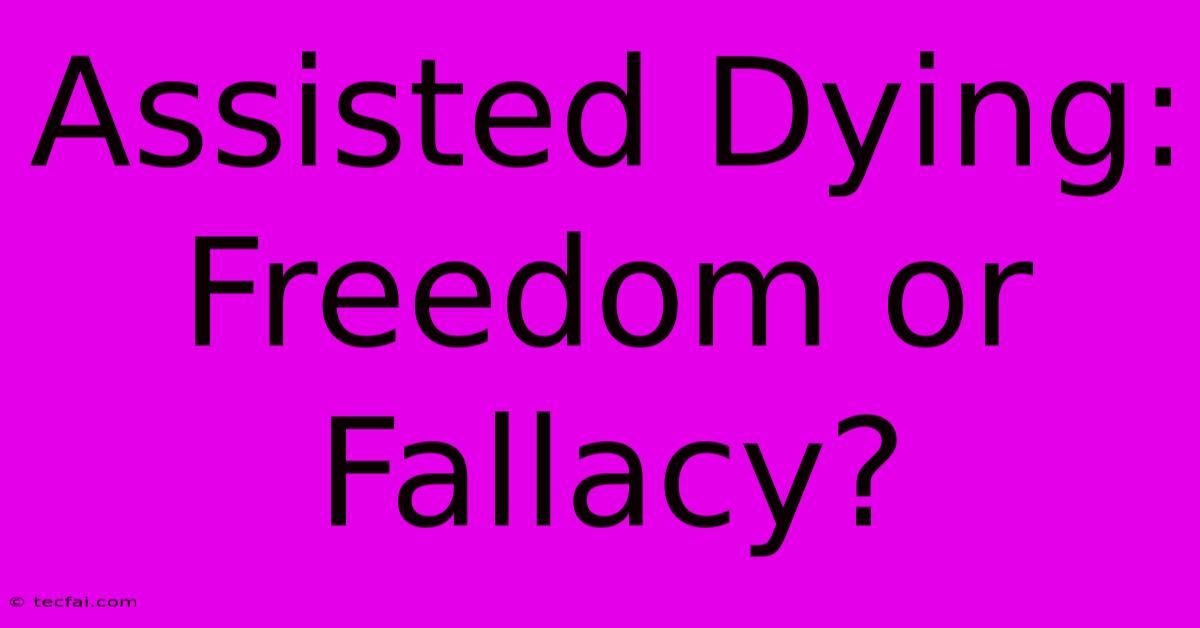Assisted Dying: Freedom Or Fallacy?

Discover more detailed and exciting information on our website. Click the link below to start your adventure: Visit Best Website tecfai.com. Don't miss out!
Table of Contents
Assisted Dying: Freedom or Fallacy?
The debate surrounding assisted dying, also known as physician-assisted suicide or medical aid in dying, is a complex and deeply emotional one. It pits the fundamental right to autonomy and self-determination against concerns about safeguarding vulnerable populations and the sanctity of life. This article explores the key arguments on both sides, examining the ethical, legal, and practical implications of allowing individuals to choose the timing and manner of their death.
The Case for Assisted Dying: A Focus on Autonomy
Proponents of assisted dying emphasize the importance of individual autonomy and the right to make choices about one's own life and death, particularly in the face of unbearable suffering. They argue that competent adults facing terminal illnesses with debilitating pain and suffering should have the option to choose a peaceful and dignified exit. This perspective centers on the following key points:
- Self-determination: The core argument rests on the belief that individuals have the right to control their own lives, including the manner of their death, when facing a terminal illness. This aligns with broader societal values of personal liberty and bodily autonomy.
- Relief from suffering: Many supporters highlight the immense physical and emotional suffering endured by individuals with terminal illnesses. Assisted dying is presented as a compassionate option to alleviate unbearable pain and suffering that cannot be adequately managed by palliative care.
- Dignity and control: The ability to choose the time and manner of one's death offers a sense of dignity and control in the face of a debilitating illness. This can be particularly crucial for individuals who wish to avoid prolonged suffering and loss of autonomy.
- Personal liberty: The right to die is framed as an extension of the right to live, emphasizing the importance of individual freedom and the right to make profound personal choices.
Addressing Concerns: Safeguards and Regulations
It's important to acknowledge that proponents of assisted dying are not advocating for unregulated access. They typically support strict safeguards and regulations to prevent abuse and protect vulnerable individuals. These safeguards might include:
- Rigorous eligibility criteria: Clearly defined conditions, such as terminal illness with a prognosis of six months or less, and a thorough assessment of mental capacity.
- Multiple physician consultations: Requiring multiple consultations to ensure the patient's decision is informed and voluntary.
- Psychological evaluations: Assessing the patient's mental state to rule out depression or coercion.
- Witness requirements: Ensuring the process is documented and witnessed to maintain transparency and accountability.
The Case Against Assisted Dying: Ethical and Societal Concerns
Opponents of assisted dying raise various ethical, societal, and practical concerns. They argue that legalizing assisted dying could have unintended consequences, potentially undermining the value of human life and endangering vulnerable individuals. Key arguments against assisted dying include:
- Sanctity of life: This argument emphasizes the inherent value of human life, regardless of the presence of suffering or disability. It posits that ending a life, even at the request of the individual, is morally wrong.
- Vulnerability and coercion: Critics express concern that vulnerable individuals, such as the elderly, disabled, or those experiencing depression, may be pressured into choosing assisted dying, even if it isn't their true desire.
- Slippery slope argument: This argument suggests that legalizing assisted dying could lead to a gradual expansion of eligibility criteria, potentially leading to involuntary euthanasia or the devaluation of the lives of disabled or elderly individuals.
- Role of medical professionals: Opponents argue that physicians' primary role is to preserve life, and assisting in death would violate this fundamental principle and erode public trust in the medical profession.
- Palliative care advancements: Some argue that advances in palliative care offer effective pain management and comfort measures, rendering assisted dying unnecessary in most cases.
A Balanced Perspective: The Importance of Continued Dialogue
The debate surrounding assisted dying is far from settled. It involves deeply held beliefs and values, and a nuanced understanding requires considering the perspectives of all stakeholders. Ultimately, the question of whether assisted dying constitutes freedom or fallacy hinges on one's ethical framework and societal priorities.
It is crucial that the conversation continues, informed by rigorous research, open dialogue, and a genuine commitment to safeguarding the rights and dignity of all individuals, especially those facing life-limiting illnesses. The focus should remain on providing compassionate care, ensuring access to effective palliative care, and fostering a society that values both individual autonomy and the sanctity of life. Finding a balance between these seemingly conflicting values remains one of the greatest challenges of our time.

Thank you for visiting our website wich cover about Assisted Dying: Freedom Or Fallacy?. We hope the information provided has been useful to you. Feel free to contact us if you have any questions or need further assistance. See you next time and dont miss to bookmark.
Featured Posts
-
Canada Post Strike Labor And The Gig Economy
Nov 26, 2024
-
Live Newcastle Vs West Ham Result
Nov 26, 2024
-
Nag Akyat Ang Chill Guy Coin Laban Ng Creator
Nov 26, 2024
-
Differing Politics United Against Assisted Suicide
Nov 26, 2024
-
Lopeteguis West Ham Changes Vs Newcastle
Nov 26, 2024
